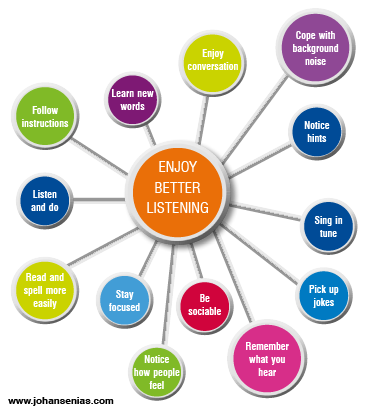Indicators of an auditory processing difficulty in a child are varied and not specific. Many issues, such as inability to sit still or sing in tune, thriving on an individual basis but getting lost in the crowd, even daydreaming, these are often attributed to hearing problems but interestingly the children referred for auditory processing assessment have all passed a hearing test.
Hearing is a sense, it is the physical ability of the ear to receive sound. Hearing is the only sense that is fully functional before we are born and is believed to be the last sense to go before we die. Listening is a learnt behaviour. It is paying attention to sound.
Listening enables our brains to interpret the sounds we hear so that we can understand.
I first became interested in APD through the work of Specialist Speech and Language Therapists, Diana Crewsden and Camilla Leslie. They talk about listening being an active process whilst hearing is more passive. Auditory processing is the clinical term for Listening. It refers to the detection and understanding of the sounds we hear.
Auditory processing is an essential aspect of understanding speech and language and it has many interactions with spatial awareness, attention, language processing, movement and balance, vision, emotion, cerebral dominance and memory. Difficulties can occur when there are inherited differences including NDD, SLI Dyspraxia, Dyslexia, ASD and ADD.
Pre-natal genetic or neurological disorders: Downs Syndrome or Cerebral Palsy.
Post-natal events such as: Emotional or language deprivation, persistent glue ear.
Glue Ear, once treated it can take up to 6 weeks for the developing brain to notice sound once the hearing returns to normal.
According to the British Audiological society in 2011: “Auditory Processing Disorder is characterised by poor perception of sounds, has its origins in impaired neural function, and impacts on everyday life primarily through a reduced ability to listen, and so respond appropriately to sounds”.
Many children may have a level of auditory processing difficulties rather than true disorder. Such difficulties might manifest in a number of ways, including:
- auditory sensitivity – Inability to ignore background noises, problematic in unstructured classrooms with high noise levels
- auditory decoding deficit – Difficulty following commands and decoding words
- organisational deficit – Difficulty in organising information efficiently to decode the meaning; drawing inference may be problematic. Socialising can be challenging
prosodic deficit – Speaking in a monotone voice - auditory memory problems

Accommodating a child with auditory processing difficulties in the mainstream classroom
Approximately two thirds of a child’s day is spent listening, checking the efficiency of auditory processing skills is surely key to helping them achieve their full potential? The following suggestions are a good starting point for most children with APD based on the work of Elizabeth Smith.
DO:
- Seat the child near where most of the verbal instructions are given (usually the front of the classroom).
- Seat away from external noise sources, windows and doors, white board, equipment fan, fidgeting or chatty peer.
- Check for understanding, ask the child to retell the instruction. Gain the child’s attention pre-instruction.
- Provide a buddy system to make sure the child has recorded homework tasks and interpreted homework instructions correctly.
- Consider using ear defenders for individual work times to minimise distractions. Allow extra time for class, homework assignments and examinations.
- Teach visual strategies as visual mnemonics, mind-mapping and the use of highlighters to identify key words in questions and colourful semantics.
- Pre-teach new vocabulary and concepts before starting a new topic.
- Devise a code system so children can indicate when they feel confused or frustrated or require further help.
- If their “auditory load” is full a simple distractor task such as a “tangle fiddle toy” or “time out zone” in the class room where they move to would help.
- Be aware they may need to fidget to listen and process. Wobble cushions are a useful aid.
- Allow longer for the child to respond.
DON’T:
- APD can be isolating and often they have low self-esteem so avoid singling them out.
- Avoid standing in front of the window when talking to the class as the sunlight distorts the visual signal of mouth shape cues which are key for listening.
Penny Anne O’Donnell is a Specialist Speech and Language Therapist with a special interest in Auditory Processing Disorder. She runs Bespoke In-House Staff training on this and many topics. To find out more or to be placed on her mailing list please email her: pennyanneod@gmail.com or call 07770 945040. Follow her on Twitter @relax_therapy

Please login to view this content
Login